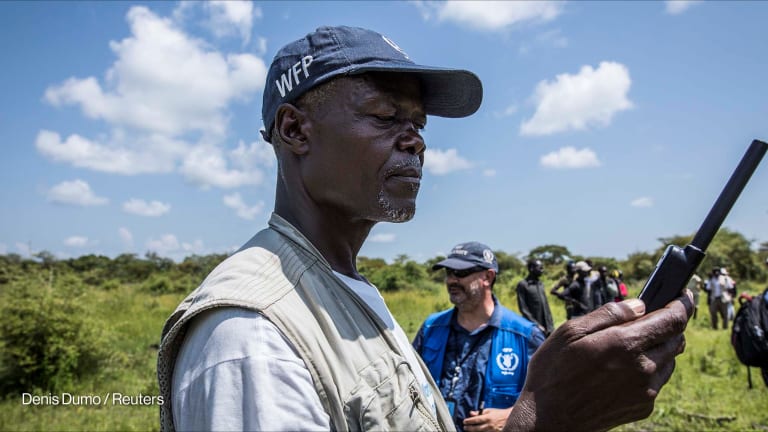
Months after Myanmar’s military coup, NGO and aid operations are still in limbo with resources scant, staff scattered, and funding inaccessible.
Military forces took control of Myanmar in February, claiming that November's democratic election — which saw the party National League for Democracy won 83% of parliamentary seats — was fraudulent.
Opposing military rule, the Civil Disobedience Movement has led many to protest or strike, and last month the main political opposition, the National Unity Government, declared a “defensive” war against the military junta. Over 1,000 people have reportedly been killed by the junta since the coup in an effort to stamp out dissent.
“It's important we don’t lose the focus on Myanmar and look through the short-term, humanitarian relief lens.”
— Joy Singhal, outgoing head of delegation for Myanmar, International Federation of Red Cross and Red Crescent SocietiesLimited mobility, labor shortages, and the disruption of key services have taken their toll on the economy. ATMs are reported to be low on cash with certain banks limiting withdrawal amounts. The World Bank estimates the country’s economy will contract by 18% in the 2021 fiscal year.
Dysfunction in the banking system has meant cash flow problems for aid organizations, a humanitarian worker, who requested anonymity for safety reasons, told Devex. “When we’re unable to make timely funding transfers to partners, they don’t have the resources to front any element of activities from their own capacity,” the humanitarian worker said.
Before February, 1 million people were already in need of humanitarian aid, while 336,000 were displaced. The conflict caused by the coup in previously peaceful parts of the country has forced many more to flee, and, according to UNICEF, “exacerbated pre-existing vulnerabilities” and “deepened humanitarian needs.”
Staffing challenges
Getting new and returning international staff — some initially left Myanmar amid the coup — into the country is also proving difficult.
While no Médecins Sans Frontières staff were forced to leave the country, Jason Mills, MSF’s deputy head of mission in Myanmar, said in an email that getting much-needed international medical expertise and management into the country has been challenging as visa and entry approvals have slowed.
Has the international community abandoned Myanmar?
A "people’s defence force" is being established to create a future without the military junta — a future the international community is reluctant to support.
Before the pandemic, the International Federation of Red Cross and Red Crescent Societies — which has worked in Myanmar for 26 years, supporting the Myanmar Red Cross — had six international staff based in Myanmar. This dropped to two as contracts came to an end and new members were unable to deploy. Until recently, Joy Singhal, IFRC’s outgoing head of delegation for Myanmar, was one of the two.
Despite targeted killings, bombings, and violence in parts of the country, he said that so far humanitarian workers have been able to operate unharmed and urged international NGOs to think about sending staff back to provide support. They would, however, have to “beef up” their security mechanisms, he said, and think about “recalibrating” their ability to work in Myanmar.
“People will have to negotiate their way through a lot of requirements that would enable you to have some level of access and that would be determined as to how much you are perceived as providing humanitarian services,” he explained.
IFRC has had to provide messaging, Singhal said, emphasizing its focus on meeting humanitarian needs rather than taking sides to ensure it remains an acceptable humanitarian institution that has the trust of the people.
A second humanitarian worker interviewed by Devex — who is waiting to return to Myanmar and mainly working in capacity building and service delivery — said their work on harnessing local trust in the government has also had to transition into building general community resilience.
“No one really wants to engage with the military because the military has put in new people all the way down to village level so there’s a lot of suspicion,” the aid worker said, adding that informants are being assassinated and township administrators attacked.
Unwilling to support the junta, some INGOs are opting not to pay taxes, the aid worker added. But this puts their ability to operate in the country in jeopardy. “You’re being penalized by not paying — there’s a penalty fee they impose — but it’s more if you don't, will you get thrown out of the country or will senior staff of organizations be detained?” the aid worker said.
The Open Society Foundations’ finance manager for Myanmar was detained earlier this year accused of financial misconduct, a claim OSF refutes.
The humanitarian worker explained how their organization has pivoted to offering cross-border support to local partners from Thailand. While not confirmed, it’s likely — given the increasing violence in response to the declaration of war — posts in Myanmar will become “unaccompanied,” meaning staff members’ families would likely live in Thailand as individuals and travel back and forth to Yangon, according to the aid worker.
Singhal said IFRC is trying to boost the number of international staff in Myanmar but, in the meantime, the staff is providing remote support. Unreliable internet connectivity — the junta has imposed internet blockages and limitations — and timezone clashes make it difficult to communicate, he said.
What the international community can do
Outside the country, what can be done to help is up for debate.
A humanitarian worker based in Yangon said that the lack of dramatic images and information coming from the country — due to the restrictions and targeting of journalists — has affected international attention. “It’s fallen out of the spotlight, but not because the situation is improving in any way,” the aid worker said.
“Myanmar is the second most at-risk country in the entire Asia-Pacific … risk of not just conflict or violence [but] risk of natural disaster, climate change, poverty, very limited health care, and WASH sanitation services, floods and earthquakes,” Singhal said. “It's important we don’t lose the focus on Myanmar and look through the short-term, humanitarian relief lens.”
This can be done, he explained, by supporting local organizations so that they can operate when international support is jeopardized.
But the internet disruptions pose a barrier to funding those initiatives, the first aid worker said. “It’s really difficult because the internet is blocked so even if we identify partners who are able [to] operate [in an area] ... there’s no institutional donor funding we’d be able to use to fund that response because there’s zero guarantee of any type of compliance requirements being met,” they explained. “They can’t even send a receipt.”
In terms of the political crisis itself, “it’s difficult to think of too many opportunities for the international community to influence the trajectory of the crisis here, unfortunately,” said the third aid worker interviewed. Some are calling for the humanitarian sector to keep pushing for a ceasefire that would allow the distribution of aid. Over the months, the Association of Southeast Asian Nations has tried to work with the junta to broker an agreement to do exactly that.
Despite initial hopes that “[United Nations] troops would save the day,” the National Unity Government will be declared as the legitimate government, or that someone would step in, “people aren’t ready to give up,” the second humanitarian worker said.








